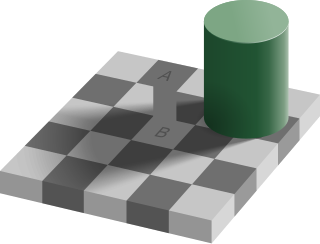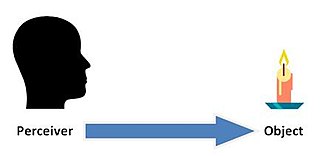Related Research Articles
Philosophy of religion is "the philosophical examination of the central themes and concepts involved in religious traditions". Philosophical discussions on such topics date from ancient times, and appear in the earliest known texts concerning philosophy. The field is related to many other branches of philosophy, including metaphysics, epistemology, and ethics.

The philosophy of perception is concerned with the nature of perceptual experience and the status of perceptual data, in particular how they relate to beliefs about, or knowledge of, the world. Any explicit account of perception requires a commitment to one of a variety of ontological or metaphysical views. Philosophers distinguish internalist accounts, which assume that perceptions of objects, and knowledge or beliefs about them, are aspects of an individual's mind, and externalist accounts, which state that they constitute real aspects of the world external to the individual. The position of naïve realism—the 'everyday' impression of physical objects constituting what is perceived—is to some extent contradicted by the occurrence of perceptual illusions and hallucinations and the relativity of perceptual experience as well as certain insights in science. Realist conceptions include phenomenalism and direct and indirect realism. Anti-realist conceptions include idealism and skepticism. Recent philosophical work have expanded on the philosophical features of perception by going beyond the single paradigm of vision.
Intentionality is the power of minds to be about something: to represent or to stand for things, properties and states of affairs. Intentionality is primarily ascribed to mental states, like perceptions, beliefs or desires, which is why it has been regarded as the characteristic mark of the mental by many philosophers. A central issue for theories of intentionality has been the problem of intentional inexistence: to determine the ontological status of the entities which are the objects of intentional states.

John Henry McDowell, FBA is a South African philosopher, formerly a fellow of University College, Oxford, and now university professor at the University of Pittsburgh. Although he has written on metaphysics, epistemology, ancient philosophy, nature, and meta-ethics, McDowell's most influential work has been in the philosophy of mind and philosophy of language. McDowell was one of three recipients of the 2010 Andrew W. Mellon Foundation's Distinguished Achievement Award, and is a Fellow of both the American Academy of Arts & Sciences and the British Academy.
Experience refers to conscious events in general, more specifically to perceptions, or to the practical knowledge and familiarity that is produced by these processes. Understood as a conscious event in the widest sense, experience involves a subject to which various items are presented. In this sense, seeing a yellow bird on a branch presents the subject with the objects "bird" and "branch", the relation between them and the property "yellow". Unreal items may be included as well, which happens when experiencing hallucinations or dreams. When understood in a more restricted sense, only sensory consciousness counts as experience. In this sense, experience is usually identified with perception and contrasted with other types of conscious events, like thinking or imagining. In a slightly different sense, experience refers not to the conscious events themselves but to the practical knowledge and familiarity they produce. In this sense, it is important that direct perceptual contact with the external world is the source of knowledge. So an experienced hiker is someone who actually lived through many hikes, not someone who merely read many books about hiking. This is associated both with recurrent past acquaintance and the abilities learned through them.
In metaphysics, phenomenalism is the view that physical objects cannot justifiably be said to exist in themselves, but only as perceptual phenomena or sensory stimuli situated in time and in space. In particular, some forms of phenomenalism reduce all talk about physical objects in the external world to talk about bundles of sense data.

In philosophy of perception and epistemology, naïve realism is the idea that the senses provide us with direct awareness of objects as they really are. When referred to as direct realism, naïve realism is often contrasted with indirect realism.

In the philosophy of perception and philosophy of mind, direct or naïve realism, as opposed to indirect or representational realism, are differing models that describe the nature of conscious experiences; out of the metaphysical question of whether the world we see around us is the real world itself or merely an internal perceptual copy of that world generated by our conscious experience.

In metaphysics, conceptualism is a theory that explains universality of particulars as conceptualized frameworks situated within the thinking mind. Intermediate between nominalism and realism, the conceptualist view approaches the metaphysical concept of universals from a perspective that denies their presence in particulars outside the mind's perception of them. Conceptualism is anti-realist about abstract objects, just like immanent realism is.
Philosophical realism – usually not treated as a position of its own but as a stance towards other subject matters – is the view that a certain kind of thing has mind-independent existence, i.e. that it exists even in the absence of any mind perceiving it or that its existence is not just a mere appearance in the eye of the beholder. This includes a number of positions within epistemology and metaphysics which express that a given thing instead exists independently of knowledge, thought, or understanding. This can apply to items such as the physical world, the past and future, other minds, and the self, though may also apply less directly to things such as universals, mathematical truths, moral truths, and thought itself. However, realism may also include various positions which instead reject metaphysical treatments of reality entirely.
A mental state, or a mental property, is a state of mind of a person. Mental states comprise a diverse class, including perception, pain/pleasure experience, belief, desire, intention, emotion, and memory. There is controversy concerning the exact definition of the term. According to epistemic approaches, the essential mark of mental states is that their subject has privileged epistemic access while others can only infer their existence from outward signs. Consciousness-based approaches hold that all mental states are either conscious themselves or stand in the right relation to conscious states. Intentionality-based approaches, on the other hand, see the power of minds to refer to objects and represent the world as the mark of the mental. According to functionalist approaches, mental states are defined in terms of their role in the causal network independent of their intrinsic properties. Some philosophers deny all the aforementioned approaches by holding that the term "mental" refers to a cluster of loosely related ideas without an underlying unifying feature shared by all. Various overlapping classifications of mental states have been proposed. Important distinctions group mental phenomena together according to whether they are sensory, propositional, intentional, conscious or occurrent. Sensory states involve sense impressions like visual perceptions or bodily pains. Propositional attitudes, like beliefs and desires, are relations a subject has to a proposition. The characteristic of intentional states is that they refer to or are about objects or states of affairs. Conscious states are part of the phenomenal experience while occurrent states are causally efficacious within the owner's mind, with or without consciousness. An influential classification of mental states is due to Franz Brentano, who argues that there are only three basic kinds: presentations, judgments, and phenomena of love and hate.
In parapsychology, an apparitional experience is an anomalous experience characterized by the apparent perception of either a living being or an inanimate object without there being any material stimulus for such a perception.
Anomalous experiences, such as so-called benign hallucinations, may occur in a person in a state of good mental and physical health, even in the apparent absence of a transient trigger factor such as fatigue, intoxication or sensory deprivation.
John Michael Elliott Hinton was a British philosopher. He was a lecturer at the University of Oxford from 1958 and a fellow of Worcester College, Oxford, from 1960. He was Cowling Visiting Professor at Carleton College in 1978-79. He was previously a lecturer at Victoria University College.
The theory of sense data is a view in the philosophy of perception, popularly held in the early 20th century by philosophers such as Bertrand Russell, C. D. Broad, H. H. Price, A. J. Ayer, and G. E. Moore. Sense data are taken to be mind-dependent objects whose existence and properties are known directly to us in perception. These objects are unanalyzed experiences inside the mind, which appear to subsequent more advanced mental operations exactly as they are.

Everett Wesley Hall was an American philosopher, known for his advocacy of common-sense realism and his notion of what he called the "categorial" primacy of certain assertions. Hall received his A.B. and M.A. degrees from Lawrence College, and his Ph.D. from Cornell University. Between 1929 and his death in 1960, he taught at the following universities: the University of Chicago, Ohio State, Stanford, the University of Iowa, and the University of North Carolina. He also held visiting appointments at Northwestern University, the University of Southern California, and Kyoto University. Hall was the author of four books as well as numerous papers. The books are What is Value (1952), Modern Science and Human Values(1956), Philosophical Systems(1960), and Our Knowledge of Fact and Value (1961). After his death a number of his papers were collected by his colleague, E. M. Adams and published as Categorial Analysis (1964).
In the philosophy of perception, critical realism is the theory that some of our sense-data can and do accurately represent external objects, properties, and events, while other of our sense-data do not accurately represent any external objects, properties, and events. Put simply, critical realism highlights a mind-dependent aspect of the world that reaches to understand the mind-independent world.

Scottish common sense realism, also known as the Scottish school of common sense, is a realist school of philosophy that originated in the ideas of Scottish philosophers Thomas Reid, Adam Ferguson, James Beattie, and Dugald Stewart during the 18th-century Scottish Enlightenment. Reid emphasized man's innate ability to perceive common ideas and that this process is inherent in and interdependent with judgement. Common sense, therefore, is the foundation of philosophical inquiry. Though best remembered for its opposition to the pervasive philosophy of David Hume, Scottish common sense philosophy is influential and evident in the works of Thomas Jefferson and late 18th-century American politics.

Donald David Hoffman is an American cognitive psychologist and popular science author. He is a professor in the Department of Cognitive Sciences at the University of California, Irvine, with joint appointments in the Department of Philosophy, the Department of Logic and Philosophy of Science, and the School of Computer Science.
Naomi Eilan is a British philosopher and professor of philosophy at the University of Warwick, whose works concern consciousness, philosophy of mind, metaphysics and philosophy of psychology.
References
- 1 2 "The Disjunctive Theory of Perception". Stanford Encyclopedia of Philosophy. Retrieved 12 July 2020.
- ↑ Timothy Chappell (2005). The Inescapable Self: An Introduction to Western Philosophy Since Descartes. Sterling. p. 64. ISBN 9780297847359 . Retrieved 2008-01-18.
- ↑ McDowell, John (2011). Perception as a capacity for knowledge (1st ed.). Marquette University Press. ISBN 9780874621792.
- ↑ J. M. Hinton, Experiences: An Inquiry Into Some Ambiguities, (1973).
- ↑ J. McDowell, "Criteria, Defeasibility and Knowledge", Proceedings of the British Academy 68 (1982), pp. 455-479.
- ↑ Brewer, Bill (2006-06-12). "Perception and its objects" (PDF). Philosophical Studies. 132 (1): 87–97. doi:10.1007/s11098-006-9051-2. S2CID 13004558.
- ↑ Campbell, John (2002). Reference and Consciousness (1st ed.). Oxford University Press. ISBN 9780199243815.
- ↑ Eilan, Naomi (2017). "Perceptual Objectivity and Consciousness: A relational Response to Burge's Challenge" (PDF). Topoi. 36 (2): 287–298. doi:10.1007/s11245-015-9325-4. S2CID 255105759.
- ↑ Soteriou, Matthew (2016). Disjunctivism (1st ed.). Routledge. ISBN 9780415686228.
- ↑ M.G.F Martin, "On Being Alienated" in T. Gendler and J. Hawthorne (eds), Perceptual Experience (2006).